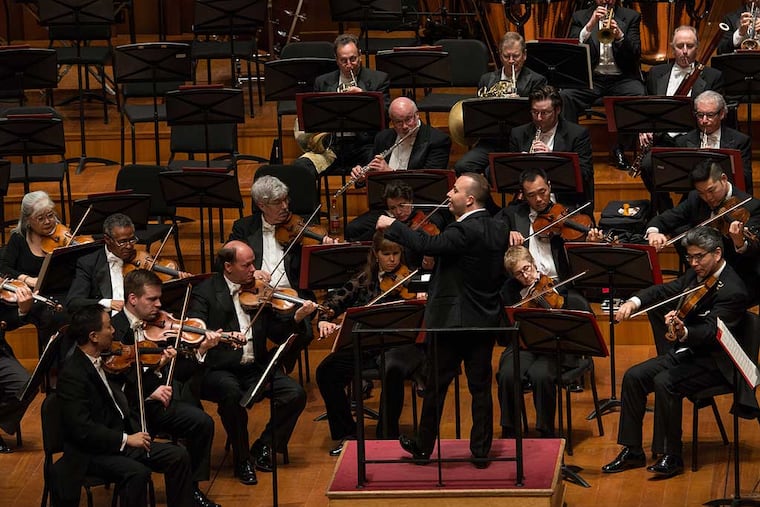How do taxpayers benefit, when Pa. helps send the Philadelphia Orchestra to China, amid a trade war?
“There are two Philadelphia brands the Chinese respect — the University of Pennsylvania’s Wharton School, and the Philadelphia Orchestra,” said an orchestra executive, and both are ways “to tie to the business conversation.”

Amid rising U.S. tariffs (taxes) on Chinese imports and threats between President Trump and Chinese leader Xi Jinping, Philadelphia Orchestra leaders portray its nearly annual visits to that most-populous nation — including the 12-day trip that starts Monday — as a long-term encouragement for China’s interest, investment, and hiring in Pennsylvania.
State and city commerce and tourism officers, city port and airport leaders, and orchestra executives crammed into an office at China’s New York consulate in December to promote the trip and other initiatives with consul general Huang Ping. When the civil servants talked trade, Huang “kept bringing the conversation back to the orchestra,” said its executive director, Ryan Fleur. “He said he had our CDs, and he can’t wait to hear the orchestra" live.
Without direct flights to Shanghai, Hong Kong, or Beijing — a deficit the city-owned Philadelphia International Airport is struggling to fix — Philadelphia has a lower profile than larger U.S. cities, he acknowledged. But “there are two Philadelphia brands the Chinese respect — the University of Pennsylvania’s Wharton School and the Philadelphia Orchestra" — and both are ways “to tie to the business conversation.”
Pennsylvania taxpayers contributed almost $1 million to help ship the orchestra to China for this month’s trip. What do state residents get out of it? The orchestra’s prior trips to China "served as a big draw for potential Chinese investors and companies to explore investment opportunities in the Philadelphia area,” Song Li, chief executive at Frontage Laboratories Inc., a pharmaceutical contract-research organization in Exton, told me in an email.
David Briel, head of Pennsylvania’s international business development office, which maintains a network of agents in China and other countries, says a Frontage affiliate sent representatives to the orchestra’s China tour in 2014, the year the company was purchased by China-based Huangzhou TigerMed.
Frontage has been “positioned to act as an ambassador for many investment groups and companies interested in the Philadelphia area,” Li added. When the orchestra toured China a couple of years later, “Frontage invited several investment firms to enjoy a concert” and gain “a broader understanding of the rich culture and amenities the Philadelphia region has to offer” as the company seeks to keep expanding here. A company affiliated with Frontage at the time, Frontida BioPharm, Inc., in 2016 acquired two Mutual Pharmaceutical plants in Northeast Philadelphia. (Update 5/15/2019)
Fleur and orchestra president Matias Tarnopolsky followed the New York visit with a trip to see China’s Foreign Ministry and Trade Ministry officials in January. “It was during one of the worst times in the trade talks,” Fleur recalled last week at the Kimmel Center, the orchestra’s home in Philadelphia.
He said China officials weren’t shy about the tariff conflict. “They wanted us to convey back home that bilateral investment and trade are so important.”
Chinese cities pay the cost of hosting the orchestra as it travels; Pennsylvania and other donors pay more than $2.5 million to send more than 100 musicians, their equipment, and support staff across the Pacific and back.
Fleur says classical music in China is roughly as popular, and as common a basis for business conversations, as pro sports in the U.S. (though sports such as basketball are also increasingly conversation starters).
He says the orchestra’s 1973 trip, after years of U.S.-Chinese isolation, was “a defining event” in China’s cultural life that marked a mass resurgence of official support and popular enthusiasm for classical music. “There are now 40 million Chinese students studying classical piano, and 30 million, classical violin,” double the estimated number in the U.S., he added. Music ranks with English among the skills that families believe set students on “a good path to increasing their chance of success.”
When the orchestra, backed by a delegation of Pennsylvania officials, visited China in 2017, “Frontage invited several investment firms to enjoy a concert,” Li added.
The fact that the Philadelphia group keeps returning to China has built its prestige there, Fleur added. Fans, and leaders invited backstage, “have such bragging rights with their friends. It paves the way for a successful economic conversation.”